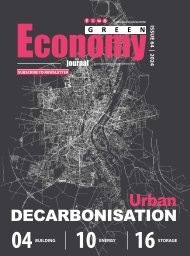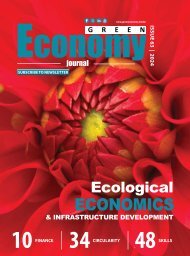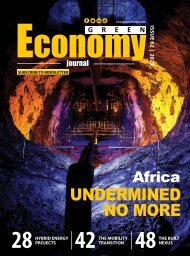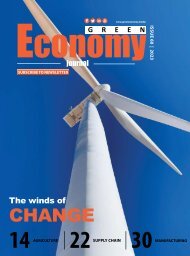Green Economy Journal Issue 48
You also want an ePaper? Increase the reach of your titles
YUMPU automatically turns print PDFs into web optimized ePapers that Google loves.
THOUGHT LEADERSHIP<br />
THOUGHT LEADERSHIP<br />
How To Put It<br />
BACK TOGETHER AGAIN<br />
Humpty Dumpty sat on a wall,<br />
Humpty Dumpty had a great fall.<br />
Four-score Men and Four-score more,<br />
Could not make Humpty Dumpty where he was before<br />
Samuel Arnold Juveline Amusements, 1797 1<br />
BY LLEWELLYN VAN WYK, B. ARCH; MSC. (APPLIED), URBAN ANALYST<br />
the world is in the early stages of a “revolution in economic policymaking”.<br />
Central banks have in effect pledged to print as much money as<br />
necessary to keep down government-borrowing costs. The European<br />
Central Bank is promising to buy everything that governments might<br />
issue thereby reducing the gap in borrowing costs between weaker<br />
and stronger euro-zone members, which widened in the early days of<br />
the pandemic.<br />
Main Street assistance programme in the history of the United States”,<br />
comparing it favourably with Wall Street bailouts a decade ago.<br />
To that end the analysts note that governments across the rich world<br />
are channelling vast sums to firms, providing them with grants and cheap<br />
loans to preserve jobs and keep their doors open. In some cases, the<br />
government is paying the wages of people who cannot work safely: the<br />
EU has embraced this policy, while the British state will pay up to 80% of<br />
the wages of furloughed workers. The American package includes loans to<br />
small businesses that will be forgiven if workers are not laid off. Households<br />
across the rich world are being given temporary relief on mortgages, other<br />
debts, rent and utility bills. In America people will also be sent cheques<br />
worth up to $1 200.<br />
Most economists support these measures. Nominally they are<br />
temporary, designed to hold the economy in an induced coma until the<br />
pandemic passes, at which point the world is supposed to revert to the<br />
status quo ante. But history suggests that a return to pre-Covid-19 days<br />
is unlikely.<br />
Humpty Dumpty is a character in an English nursery rhyme,<br />
probably originally a riddle and one of the best known in<br />
the English-speaking world. He is typically portrayed as an<br />
anthropomorphic egg, though he is not explicitly described as such.<br />
Its origins are obscure, and several theories have been advanced to<br />
suggest original meanings. I thought it particularly appropriate to<br />
describe the following article – what are the impacts of Covid on the<br />
global economy and how does it recover.<br />
Impact and Response<br />
Many commentators and economists are focusing on how governments<br />
go about rebuilding their national and city economies once the world has<br />
passed through what Christopher Joye calls the Global Virus Crisis (GVC). 2<br />
According to The Economist, policy response has generally been swift and<br />
decisive. 3 Globally central banks have cut interest rates since January 2020<br />
and have launched new and substantial quantitative-easing schemes<br />
(creating money to buy bonds) while politicians are opening the fiscal taps<br />
to support the economy.<br />
In the US, America’s Congress passed a bill that boosts spending by<br />
twice as much as President Barack Obama’s package in 2009. Britain,<br />
France, and other countries have made credit guarantees worth as much<br />
as 15% of GDP, seeking to prevent a cascade of defaults. On the most<br />
conservative measure, the global stimulus from government spending<br />
this year will exceed 2% of global GDP, a much bigger push than was seen<br />
in 2007-09. Even Germany, whose fiscal rectitude is a cultural cliché, is<br />
spending more. 4<br />
The analysts at The Economist caution though that to focus just on the<br />
quantitative changes misses something crucial which is that there are<br />
important qualitative changes under way in how policymakers manage<br />
the economy – the responsibilities they have assumed for themselves,<br />
what is seen as a legitimate action and what is not, and the criteria used<br />
to judge policy success or failure. On these measures, the analysts note,<br />
The analysts note that politicians, too, are ripping up the rulebook. In<br />
past recessions enterprises could go bankrupt and people too become<br />
unemployed. Even in normal economic times, roughly 8% of businesses in<br />
OECD countries go under each year, while 10% or so of the workforce lose a<br />
job. Now governments hope to stop this from happening entirely. President<br />
Emmanuel Macron reflects the view of many when he vows that no firm will<br />
“face the risk of bankruptcy” because of the pandemic. Boris Johnson, Britain’s<br />
prime minister, contrasts his government’s response with the one during the<br />
last financial crisis: “Everybody said we bailed out the banks and we didn’t look<br />
after the people who really suffered”. Larry Kudlow, the director of America’s<br />
National Economic Council, calls America’s fiscal stimulus “the single largest<br />
8<br />
9


















